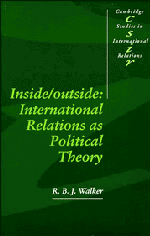Book contents
- Frontmatter
- Contents
- Preface
- 1 International relations as political theory
- 2 The Prince and ‘the pauper’
- 3 Ethics, modernity, community
- 4 History, structure, reification
- 5 Realism and change
- 6 The territorial state and the theme of Gulliver
- 7 On the spatio-temporal conditions of democratic practice
- 8 Sovereign identities and the politics of forgetting
- Notes
- Bibliography
- Index
4 - History, structure, reification
Published online by Cambridge University Press: 05 July 2011
- Frontmatter
- Contents
- Preface
- 1 International relations as political theory
- 2 The Prince and ‘the pauper’
- 3 Ethics, modernity, community
- 4 History, structure, reification
- 5 Realism and change
- 6 The territorial state and the theme of Gulliver
- 7 On the spatio-temporal conditions of democratic practice
- 8 Sovereign identities and the politics of forgetting
- Notes
- Bibliography
- Index
Summary
Beyond hegemony, before epistemology
In some respects, claims about ethics or about the wisdom of perennial traditions of political realism have come to seem distinctly old fashioned. From at least the 1960s, explicit theoretical controversy has focused more insistently on the character and appropriateness of claims about social science. As with so many other disciplines that have been shaped by the broader ambitions of an empirically conceived social science, such controversy has occurred largely on the terrain of epistemology. Very often, the more far-reaching epistemological problems posed by those who seek to understand what is involved in making knowledge claims about social and political processes have been pushed aside in favour of even more restricted concerns about method and research techniques. Narrowing the range of potential dispute in this manner has undoubtedly enhanced an appearance of professional solidarity. It has also obscured many of the more troublesome and more important fractures now visible within contemporary debates about the general nature and possibility of social and political inquiry. Not least, many of the problems that I have posed in relation to claims to political realism and political idealism may also be posed in the context of continuing efforts to secure the analysis of international relations upon firm epistemological foundations.
The specifically epistemological claims of empirical social science have been challenged on many grounds, and there is little point in rehearsing the resulting controversies here.
- Type
- Chapter
- Information
- Inside/OutsideInternational Relations as Political Theory, pp. 81 - 103Publisher: Cambridge University PressPrint publication year: 1992

